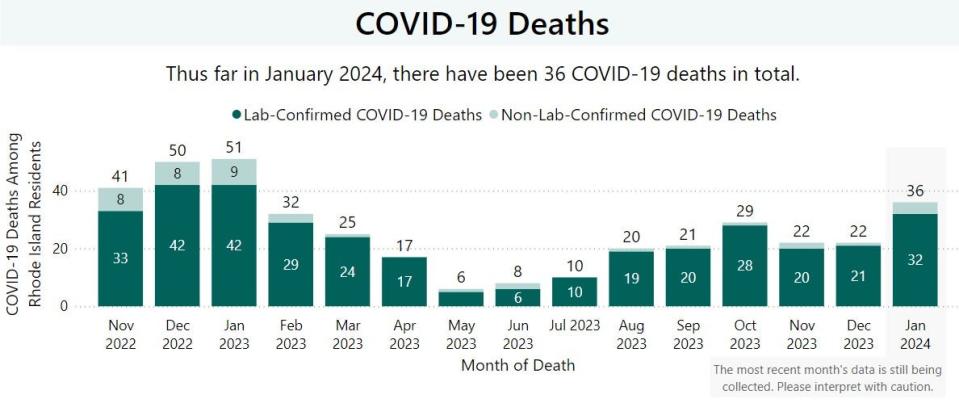COVID-19 hospital admissions fall after holiday spike. Why you should still keep your guard up
PROVIDENCE – The COVID-19 admission level at Rhode Island hospitals has dropped from "medium" to "low," but that doesn't mean Rhode Islanders should let their guard down, according to the state Department of Health.
"Rates of COVID-19 still elevated throughout Rhode Island. We are still seeing hundreds of people hospitalized every month because of COVID-19," said Joseph Wendelken, spokesman for the health department.
The holidays sparked an increase in COVID cases, and the state's hospital admission level was increased from "low" to "medium" on Jan. 5. It fell back to "low" on Jan. 26, according to the health department.

The health department says it uses hospital admission levels as a tool to measure COVID risk statewide. It characterizes levels as "low," "medium" or "high" based on the state's population. "Low" means hospital admissions are below 10 per 100,000 Rhode Islanders per week.
In December, Rhode Island hospitals had 401 admissions for COVID-19, according to the health department. In January, the number was 368, but the health department notes that January data is still being collected, so that number could change.
More: Post-holiday COVID surge has forced local hospitals to reinstate masking policies
How many people in Rhode Island died from COVID-19 in January?
In December, Rhode Island had 22 deaths from COVID. In January, the state had 36 COVID deaths. (Again, the health department notes that the January data is still being collected.)
With the increase in admissions last month, Lifespan and Care New England hospitals reinstituted masking requirements. Those requirements are still in place.

"Mask requirements remain at Care New England hospitals and within any of our medical buildings where patients may be present," said Doreen Scanlon Gavigan, public relations manager for Care New England. "We are still seeing a significant number of respiratory illnesses in our community, although levels are beginning to fall. We will continue to monitor indicators closely."
Here are tips to avoid catching or spreading COVID
The health department provided the following COVID-prevention tips:
Get vaccinated. The 2023-2024 COVID-19 vaccine is recommended for everyone older than 6 months of age. You can get the 2023-2024 COVID-19 vaccine even if you have not received COVID-19 vaccines previously. Vaccine is available throughout Rhode Island. In addition to preventing serious illness and hospitalization, COVID-19 vaccine can also help prevent the spread of COVID-19.
Get tested for COVID-19 if you have any of the classic symptoms of the disease, such as fever or chills, a runny nose, a cough, achiness, or loss of taste or smell. If you have household or social contact with someone at high risk for getting very sick, consider self-testing for COVID-19 before seeing that person.
If you are sick, stay home. It is particularly important to avoid contact with people who are more vulnerable to severe illness.
If you have COVID-19, the CDC’s Isolation Calculator can help you determine how long you should stay home and isolate away from others. COVID-19-specific isolation guidelines are available online.
If you have a fever but do not have COVID-19, still stay home for at least 24 hours after your fever is gone. Your temperature should be measured without the use of fever-reducing medicines (medicines that contain ibuprofen or acetaminophen).
This article originally appeared on The Providence Journal: RI Health: COVID hospitalizations fall but don't let your guard down

